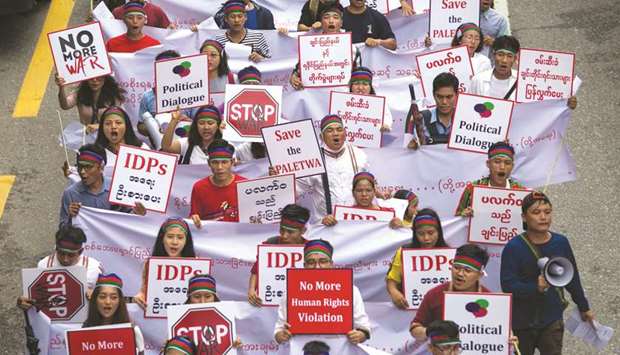In Rakhine state, where security forces expelled more than 700,000 ethnic Rohingya Muslims in a 2017 campaign the United Nations says was carried out with “genocidal intent”, Myanmar’s military is waging a new war.
This time, the target is the Arakan Army, an armed group that recruits from among state’s mostly Buddhist ethnic Rakhines and has been fighting for greater autonomy for the region that was an independent kingdom for centuries.
In its calls for an armed “revolution”, the Arakan Army draws on deep-seated historical resentment felt by some Rakhines towards the ethnic Bamar majority that dominates the central government, and their sense that Myanmar’s faltering transition to democracy has not brought the western state greater prosperity or self-determination.
The authorities imposed an unprecedented Internet shutdown across the region in late June, citing the need to avert unrest. Yanghee Lee, the UN expert on human rights in Myanmar, said last week that both sides may be committing “war crimes” under the cover of the blackout, citing reports of deaths during army interrogations.
During a rare trip by Reuters to the conflict zone, much of which is off-limits to journalists and humanitarian agencies, 10 residents gave accounts of soldiers firing weapons indiscriminately, killing and wounding civilians, and torturing detainees.
According to three lawmakers in the region and Amnesty International, the military has deployed as many as five Light Infantry Divisions - shock troops famed for brutal counter-insurgency campaigns against the nation’s myriad ethnic armed groups.
“What’s astonishing is that some of the same military units responsible for atrocities against the Rohingya are now committing new abuses in Rakhine,” said Laura Haigh, Amnesty’s Myanmar researcher.
Contacted by phone, Zaw Min Tun, a military spokesman, said such abuse of detainees “might happen or might not happen”, adding that allegations would be investigated.
“I am not denying there is abuse or torture during the period of arrest, because this kind of thing might be happening on the ground level, whatever we order,” he said.
“If that kind of thing happens, we can go through the legal process. We always take action against our military men who unjustly torture people.”
Three hours by boat from the state capital of Sittwe up the languid Kaladan river, Mrauk-U was for more than 300 years the capital of an independent Rakhine kingdom, until it was annexed
by the Burmese in 1784.
Despite rich oil reserves and a strategic location on the Bay of Bengal, the state is one of
Myanmar’s poorest.
Before the recent fighting, the town was popular with tourists who came to see the ancient temples that dot the landscape.
Now, displaced villagers camp in tents in the shadows of the monuments and, in the town, families sleep in bunkers loaded with sandbags to escape shelling and gunfire.
In Lekkar village, half a dozen residents said troops from the 22nd and 55th LIDs fired indiscriminately into the village, driving inhabitants into a monastery where they were detained, separated by gender, questioned, and forced to squat for hours under the hot sun.
Soldiers then took 27 men and held them for several weeks in an interrogation centre where, according to three of the detainees and six family members of the arrested men, they were kept in darkness, deprived of food and water, and subjected to beatings and electrocution. One man told his wife a fellow detainee was forced to stand on his tip-toes with a noose tied around his neck.
National police spokesman Colonel Myo Thu Soe did not answer calls seeking comment. A police officer in the state capital Sittwe hung up the phone.
Outside a courtroom in Sittwe last week, the detained men taken in the same raid said they were innocent and urged journalists to “tell the truth” about what had happened to them. They have been charged with breaking the Terrorism Act, punishable with up to 10 years in prison, and are on remand awaiting trial.
“They tortured us in many ways,” one of the men shouted. “We were beaten in so many ways.”
Khin Shwe Than, the mother of one of the detainees, a 16-year-old boy, said he told her he was kept in a dark cell, deprived of food and water and beaten.
The central government led by Nobel laureate Aung San Suu Kyi has little support in an area where her National League for Democracy party lost to the Arakan National Party in the 2015 election that brought her to power.
Suu Kyi called for the armed forces to “crush” the rebels during a meeting with the military chief in January, her spokesman said.
On June 21, the Ministry of Transport and Telecommunications directed all telecoms companies to “temporarily” disable internet services in nine townships across Rakhine and neighbouring Chin state, citing “disturbances of peace and use of internet activities to
coordinate illegal activities”.
Human Rights Watch says as many as 1mn people have been hit.
Myo Swe, a spokesman for the Ministry of Communications and Information Technology, told Reuters the shutdown was in the “public interest” and connectivity would be restored when “rule of law and security” could be ensured.
Khine Thu Ka, a spokesman for the Arakan Army, said the military had sent in reinforcements in recent days overland and by boat. “We can say fighting and clashes are happening frequently since the Internet shutdown,” he said.
The UN says more than 35,000 people have been forced to flee their homes since January because of the fighting.
International / ASEAN/Philippines
Fresh allegations of ‘war crimes’ emerge in Myanmar’s conflict-torn Rakhine

Ethnic Chin people hold placards during a protest asking for an end to conflict in Chin state and Rakhine state, in Yangon yesterday.
